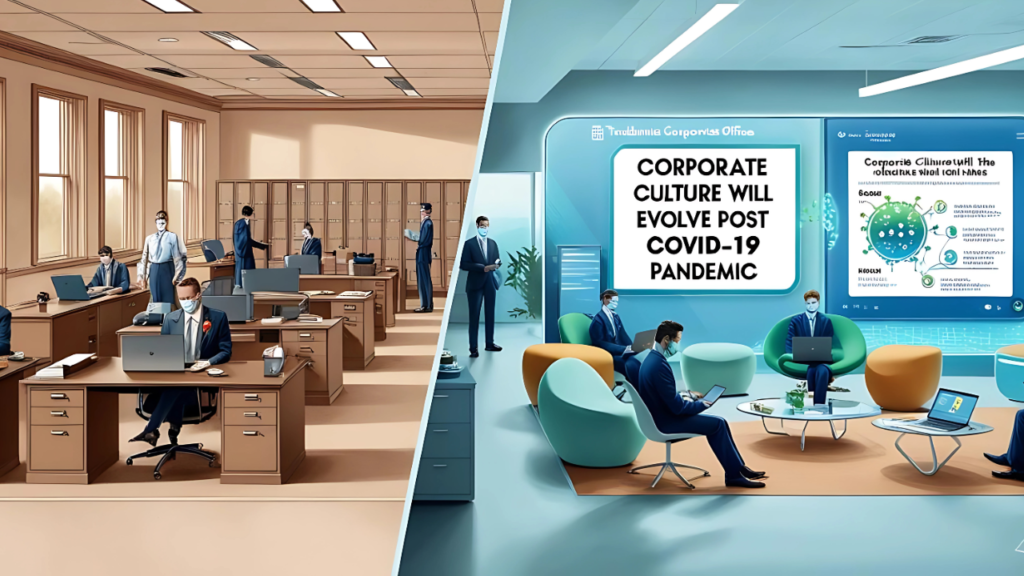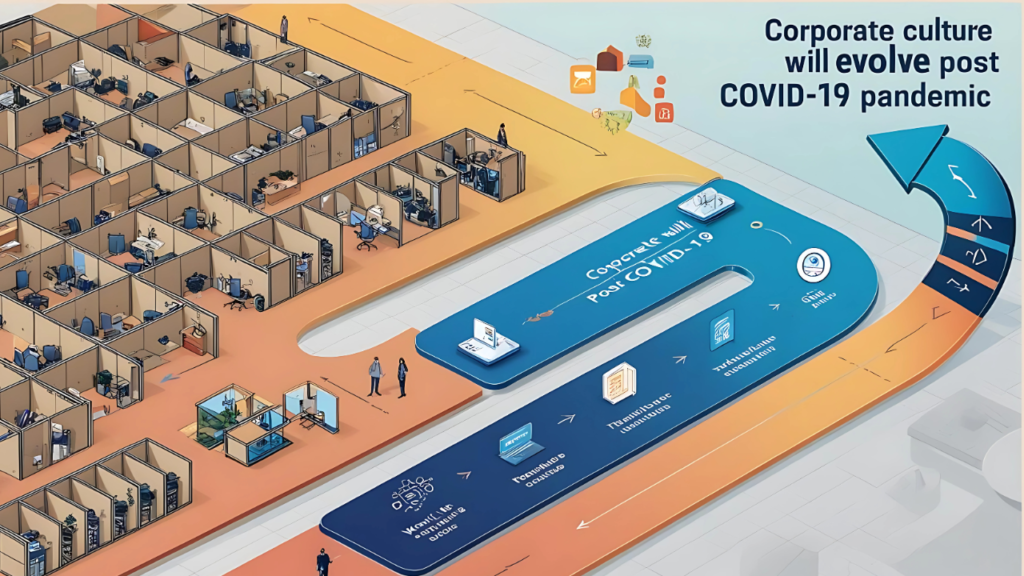The Future of Work: How Corporate Culture Will Evolve Post-Pandemic

The COVID-19 pandemic has acted as a catalyst for transformation across industries, changing how businesses operate, engage with employees, and interact with customers. The shift to remote work, the rapid adoption of digital tools, and a reevaluation of work-life balance have all contributed to a reimagining of the traditional workplace. As we look ahead to 2025, businesses are tasked with adapting their corporate culture to accommodate new working styles, prioritize employee well-being, and embrace innovation in ways that support both organizational growth and employee satisfaction. This article explores the future of corporate culture in a post-pandemic world and the key elements businesses must focus on to thrive in the evolving work environment.
- Remote Work: The New Normal in Corporate Culture
The most significant change brought about by the pandemic was the widespread adoption of remote work. What started as a necessity has now evolved into a permanent feature of corporate culture for many organizations. As companies prepare for the future, the challenge will be to create a hybrid work environment that balances the flexibility of remote work with the need for in-person collaboration.
By 2025, businesses will need to establish clear guidelines for remote and hybrid work, ensuring that employees have the tools, resources, and support they need to succeed outside of a traditional office setting. This includes investing in digital collaboration tools, virtual team-building activities, and ensuring that employees feel connected, even if they are working from different locations.
The flexibility to work from home or the office will become a standard offering, with companies recognizing that a one-size-fits-all approach no longer works. As businesses adapt, it will be crucial to find the right balance between autonomy and accountability, ensuring that productivity remains high without sacrificing employee satisfaction or well-being.
- Redefining Leadership in a Remote and Hybrid World
As the workplace becomes more dispersed, leadership must evolve. Traditional management styles that rely heavily on physical presence and face-to-face interaction will need to be adjusted to accommodate remote teams. By 2025, leaders will need to be adept at managing virtual teams, ensuring communication is clear and effective, and fostering a sense of connection, even when employees are miles apart.
This shift will require leaders to embrace emotional intelligence, empathy, and adaptability. Rather than focusing solely on monitoring productivity, leaders will need to prioritize supporting their employees’ personal and professional development, providing them with opportunities to grow, collaborate, and contribute to the company’s overall success.
Moreover, leadership will need to ensure that corporate culture remains strong despite the physical distance. This includes reinforcing company values, encouraging open dialogue, and offering opportunities for employees to engage with leadership in meaningful ways, whether through virtual town halls, feedback sessions, or one-on-one check-ins.
- Employee Well-Being: A Top Priority in the Future of Work
In the post-pandemic era, employee well-being has emerged as a top priority for organizations. The line between work and personal life has blurred, and many employees are experiencing burnout and mental health challenges as a result. As companies move forward, they must focus on creating a work culture that supports not only the professional but also the personal well-being of their workforce.
By 2025, businesses will be expected to implement more robust well-being initiatives, which go beyond basic benefits packages. Companies will need to offer mental health support, flexible working hours, and programs that promote work-life balance. In addition, corporate wellness initiatives that address physical, mental, and emotional health will be essential in attracting and retaining top talent.
Furthermore, organizations will need to ensure that their cultures are inclusive and supportive, fostering a sense of belonging for all employees, regardless of location, background, or personal circumstances. This focus on well-being will help improve job satisfaction, employee engagement, and overall performance.

- The Role of Technology: Enabling Seamless Collaboration and Innovation
As businesses transition to hybrid or fully remote environments, technology will play a critical role in maintaining operational efficiency and fostering innovation. In 2025, businesses will need to invest in advanced digital tools that support seamless collaboration, knowledge-sharing, and innovation.
Platforms that integrate communication, project management, and document sharing will be essential for facilitating smooth workflows across teams. Tools powered by artificial intelligence (AI), machine learning, and automation will further enable employees to streamline tasks, enhance productivity, and collaborate in new and creative ways.
Moreover, the adoption of virtual and augmented reality (VR/AR) technologies may become more common, offering immersive ways for employees to collaborate, participate in meetings, or engage in training programs. This integration of cutting-edge technology will allow companies to stay competitive, attract top talent, and foster an environment of continuous learning and development.
- Emphasis on Diversity, Equity, and Inclusion (DEI)
The focus on diversity, equity, and inclusion (DEI) is set to intensify as companies recognize the importance of creating workplaces where all employees feel valued and respected. In a post-pandemic world, where many companies are adopting remote work practices, ensuring that DEI initiatives are embedded into the corporate culture will be crucial.
By 2025, organizations will need to take a more proactive approach to DEI, going beyond diversity quotas and focusing on creating equitable opportunities for all employees. This includes addressing unconscious bias in recruitment, providing mentorship programs, offering equal access to career development opportunities, and ensuring diverse perspectives are heard at all levels of decision-making.
Creating a truly inclusive corporate culture will also involve making adjustments to work environments and practices that consider the needs of all employees, including those with disabilities or caregiving responsibilities. As a result, businesses that prioritize DEI will be better positioned to attract and retain top talent from diverse backgrounds.
- Agility and Adaptability: Navigating Change in an Uncertain Future
The pandemic highlighted the importance of agility and adaptability in the face of uncertainty. Businesses that were able to pivot quickly and adjust their strategies to meet changing market demands were better positioned for success. In the future, companies will need to continue prioritizing agility, creating a corporate culture that can respond to unexpected challenges with speed and flexibility.
This will involve empowering employees to take initiative, encouraging innovation, and creating an environment where failure is seen as an opportunity for learning rather than something to be feared. A culture of continuous improvement and responsiveness will be critical to the long-term success of organizations in a rapidly changing world.
Creating a corporate culture that prioritizes the needs of employees, fosters collaboration, and embraces change will be key to staying competitive in the years to come. By 2025, organizations will need to fully integrate these principles into their everyday practices to build a resilient, sustainable, and thriving workplace for the future.





